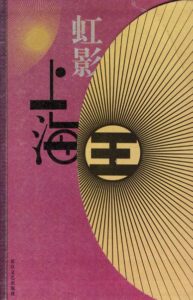Lord of Shanghai
上海王
China, 2016, colour/b&w, 2.35:1, 108 mins.
Director: Hu Xuehua 胡雪桦 [Sherwood Hu].
Rating: 5/10.
Though strongly cast, this commercial potboiler is just a conventional Shanghai gang drama.
Shanghai, 1905. The rule of the Qing dynasty government is hanging by a thread as the “open city” is controlled by western powers and adventurers. Among the most powerful in the city is Chang Lixiong (Hu Jun), head of the Hong triad. When Huang Peiyu (Qin Hao), a representative of the anti-Qing Revolutionary Alliance arrives by boat, he is almost arrested by Song (Liu Peiqi), the city’s garrison commander, but manages to escape thanks to Chang Lixiong. Though Chang Lixiong does not immediately contact Huang Peiyu directly, Song suspects the former’s involvement. Chang Lixiong further annoys Song when, at the Yipin bordello, run by Xin Daiyu (Bai Ling), he sees Song abusing a girl and forces him to sell her. Xiaoyuegui (Li Meng) is a peasant girl from Pudong, across the river; but Chang Lixiong installs her in luxury in the bordello. After another failed attempt to arrest Huang Peiyu, Song has Xiaoyuegui kidnapped to try to force Chang Lixiong into the open; but she’s rescued by Huang Peiyu. One of Song’s spies, who also works for the Blue Dragon Society, tries to kill Chang Lihong at Yipin one night; instead, Xiaoyuegui is wounded. In retaliation, Chang Lihong orders his loyal minder, half-Chinese orphan Yu Qiyang (Feng Xiaoyue), to massacre Blue Dragon Society members. Chang Lihong and Huang Peiyu finally meet and forge an anti-Qing alliance, but Song and his men ambush them outside the building. In a showdown, Song is killed, but afterwards Chang Lihong is also mortally wounded by another hand and dies in Xiaoyuegui’s arms. She leaves for Pudong, Huang Peiyu is elected head of Hong triad, and Yu Qiyang is sent to Japan. Ten years later, in 1915, Xiaoyuegui 小月桂, under the slightly different name Xiao Yuegui 筱月桂 (Yu Nan), is a popular singer, though she still longs for Lili (Ma Weiei), the child she had by Chang Lihong but was forced to sign over for adoption to Xin Daiyu, now married to western businessman Jensen (Johann Urb). Yu Qiyang is back from Japan and contacts her and Huang Peiyu. When Yu Qiyang protects her against the unwelcome attentions of the spoiled son (Purba Rgyal) of military commissioner Lu (Tobgyal), Huang Peiyu steps in as her protector. A war to the death breaks out between him and the Lu family.
REVIEW
Based on the 2003 novel by Chongqing-born writer Hong Ying 虹影, gangster drama Lord of Shanghai 上海王 is a straightforward commercial potboiler whose name cast is far better than the film deserves. Directed and co-written by Shanghai-born Chinese American Hu Xuehua 胡雪桦 [Sherwood Hu], it moves like an express train, has a typically 1980s look and approach, is plastered with intrusive music from end to end, and is only made watchable by its over-qualified lead players. The artistic bar for period Shanghai gangster movies has risen dramatically in the past decade, with recent examples like Gone with the Bullets 一步之遥 (2014), One Step Away 触不可及 (2014) and The Wasted Times 罗曼蒂克消亡史 (2016) leading the way. Lord of Shanghai simply looks corny and old-fashioned by comparison, and lacks the superbly tooled entertainment values of The Last Tycoon 大上海 (2012). Shot in early 2014 and finally released three years later as the first half of a diptych, it crashed at the box office with only RMB14 million. The second part, originally to have been released a month later on 16 Mar 2017, has gone MIA. [It was finally released, online, on 22 Aug 2020.]
Elder brother of the more talented film director Hu Xueyang 胡雪杨 (Living Dream 牵牛花 童年时代我的梦游故事, 1996; Ice Speed 冰与火, 1999), Hu, who’s in his mid-50s and whose roots are more in theatre, has one of the most bizarre filmographies in the Mainland industry, including prehistoric drama Warrior Lanling 兰陵王 (1995) shot in Hawaii in an invented language, a Tibetan version of Hamlet called Prince of the Himalayas 喜玛拉雅王子(2006), and the laughably messy sci-fi/basketball drama Amazing 神奇 (2013). Throughout his career, he’s maintained close ties with Shanghai Film Group, which is again on board for this one, his least out-there production to date.
Lavishly outfitted, it has a conventional studio look, commercial 1980s/1990s storytelling techniques and a screenplay (co-credited to Hong Ying herself, plus veteran writer/journalist Pang Bei 庞贝) that’s entirely incident-driven with almost no downtime. Playing like a cut-down version of a much longer movie, it barely makes sense in several sections, and especially the final half-hour as it hurtles towards a running-time of less than two hours.
 Even though it starts in 1905, during the final years of the ailing Qing dynasty, the film is basically another riff on the Shanghai gangster genre usually set during the Republican 1920s or 1930s. Hong Ying’s novel (see first edition, left) traverses three generations of crimelords (of which two are showcased here) but the irony is that the real Lord is actually a Lady – the great survivor Xiao Yuegui, a peasant girl from Pudong, across the river, who rose on the arms of powerful, ruthless men. Now 40, actress Yu Nan 余男 has both the physical stature and the bearing to make her believable when she appears an hour in as an adult, and to add flecks of character here and there; but she’s also well trailed in the first half by 26-year-old actress Li Meng 李梦 (Rock Hero 摇滚英雄, 2015; Young Love Lost 少年巴比伦, 2015), who isn’t given much dialogue but holds her own on the screen against older actors like Hu Jun 胡军 and Bai Ling 白灵. (Taiwan actress Guo Caijie 郭采洁 [Amber Kuo] plays Xiao Yuegui’s adult daughter in the so-far unseen Lord of Shanghai II 上海王II.)
Even though it starts in 1905, during the final years of the ailing Qing dynasty, the film is basically another riff on the Shanghai gangster genre usually set during the Republican 1920s or 1930s. Hong Ying’s novel (see first edition, left) traverses three generations of crimelords (of which two are showcased here) but the irony is that the real Lord is actually a Lady – the great survivor Xiao Yuegui, a peasant girl from Pudong, across the river, who rose on the arms of powerful, ruthless men. Now 40, actress Yu Nan 余男 has both the physical stature and the bearing to make her believable when she appears an hour in as an adult, and to add flecks of character here and there; but she’s also well trailed in the first half by 26-year-old actress Li Meng 李梦 (Rock Hero 摇滚英雄, 2015; Young Love Lost 少年巴比伦, 2015), who isn’t given much dialogue but holds her own on the screen against older actors like Hu Jun 胡军 and Bai Ling 白灵. (Taiwan actress Guo Caijie 郭采洁 [Amber Kuo] plays Xiao Yuegui’s adult daughter in the so-far unseen Lord of Shanghai II 上海王II.)
Hu, 49, dominates the first half as crimelord Chang Lixiong in a performance that’s minimal acting and mostly physical presence, but does the job without giving much insight into what makes the character tick. Hu leaves the more impassioned stuff to the younger Qin Hao 秦昊, 37, as an anti-Qing revolutionary who allies himself with Chang Lixiong and eventually takes over his position. Again, it’s a solid performance by Qin within the limits allowed by the script and editing, but the film simply trades on the actor’s charisma rather than being at all revelatory about his character. Drifting around somewhere in the middle are half-British Taiwan actor Feng Xiaoyue 凤小岳 [Rhydian Vaughan], who’s not all convincing here as the crimelords’ ruthless fixer but should come more into his own in the sequel, and Bai, 55, almost unrecognisable under her wig and make-up in an eccentric performance as a bordello madame.
Widescreen photography by Polish-born, US-based Andrzej Sekuła (Pulp Fiction, 1994; American Psycho, 2000) is fine but brings nothing special to the table, while production design by Canada’s David Brisbin (My Own Private Idaho, 1991; The Day the Earth Stood Still, 2008) adds nothing to the Shanghai Film Studio backlot look. Visual effects are also routine, apart from an eye-popping montage showing the fall of the Qing dynasty and passage of 10 years halfway through.
Hong Ying’s novel was previously adapted into a 32-part TV drama, The King of Shanghai 上海王 (2008), starring Hong Kong’s Zhong Hanliang 钟汉良 [Wallace Chung] and China’s Yuan Li 袁立, and directed by Hong Kong’s Pan Wenjie 潘文杰. An end title dedicates the film to the director’s mother, Shanghai-born theatre actress Gu Menghua 顾孟华 who emigrated to the US in 1991. A good chunk of the dialogue is in Shanghainese, as well as occasional (clumsy) use of English.
CREDITS
Presented by Shanghai Film Group (CN), Hu’s Entertainment (CN), Shanghai International Culture Communication (CN).
Script: Hu Xuehua [Sherwood Hu], Hong Ying, Pang Bei. Novel: Hong Ying. Photography: Andrzej Sekuła. Editing: Zhang Jiahui [Cheung Ka-fai], Chen Xiaohong. Music: Johnny Klimek. Production design: David Brisbin. Art direction: Shen Lide. Costume design: Mo Xiaomin. Sound: Zhan Xin. Visual effects: Zhuang Wenhua, Zhuang Yan.
Cast: Hu Jun (Chang Lixiong), Yu Nan (Xiao Yuegui/Cassia), Qin Hao (Huang Peiyu), Feng Xiaoyue [Rhydian Vaughan] (Yu Qiyang), Bai Ling (Xin Daiyu), Li Meng (young Xiaoyuegui/Cassia), Liu Peiqi (Song, garrison commander), Tobgyal (Lu, general), Cao Kefan (Chang Lixiong’s private secretary), Purba Rgyal (Lu’s son), Xu Dongdong (Lu Xianglan), He Saifei (Jin), Wang Rugang (Shen Erye, Blue Dragon Society head), Tong Ruimin (mayor), Zhang Chenghao (Crocodile), Lv Junjie (Hong Wuye), Song Huaiqiang (Chen), Johann Urb (Jensen, Xin Daiyu’s husband), James Bennett (Thompson), Yao Xiaobao (Seventh Brother, Hong triad), Fang Ge, Wang Luoding, Chen Yongqing, Cao Yu (Shanghai crime lords), Apphia (black singer), Liu Rong (bordello assassin), Zhou Tingting (Xiufang), Ma Weiwei (young Lili/Lily).
Premiere: Shanghai Film Festival (Closing Film), 19 Jun 2016.
Release: China, 17 Feb 2017.
